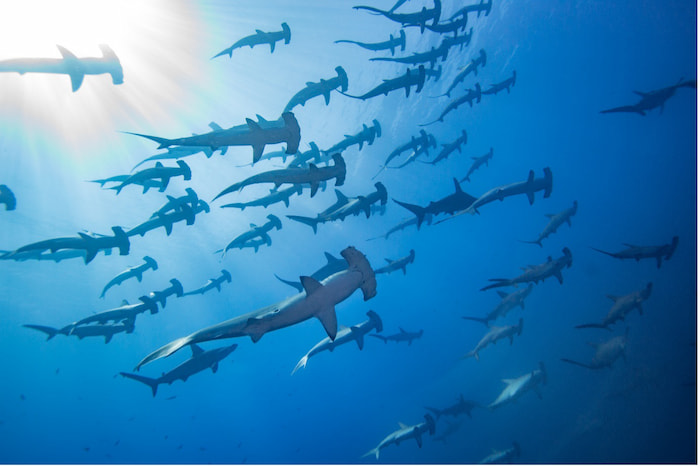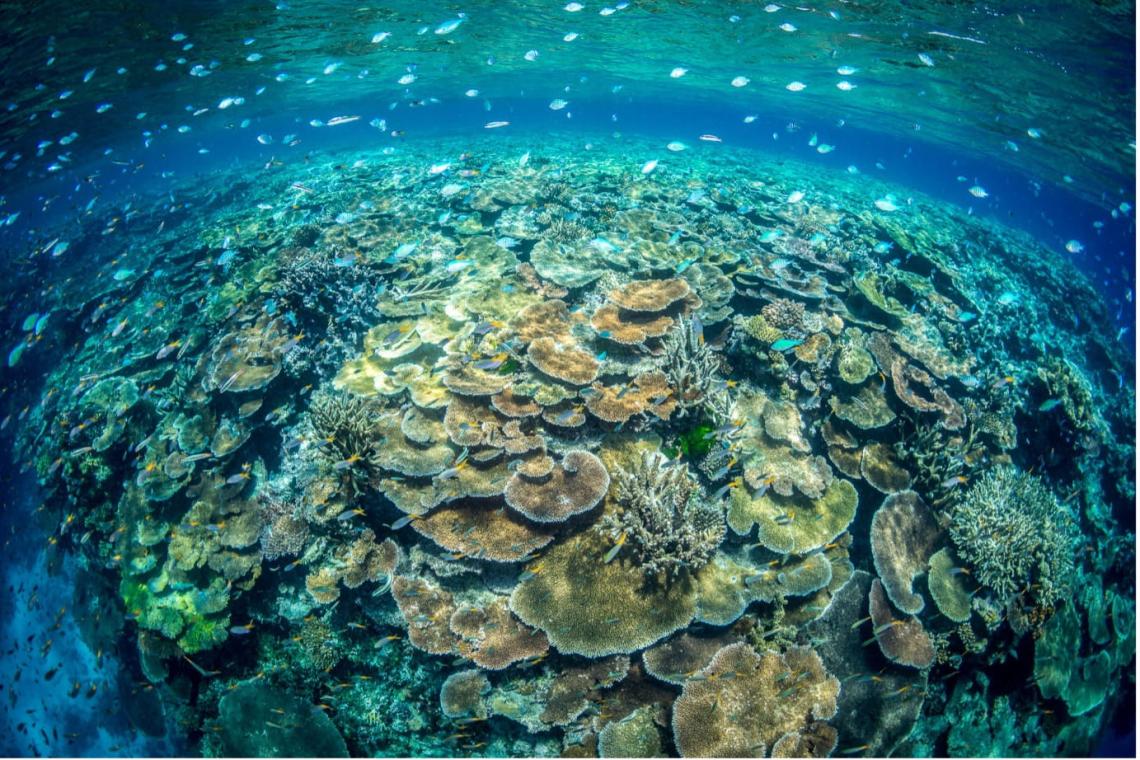Marine heatwaves are becoming an increasingly common occurrence across the globe, causing a plethora of negative impacts throughout marine ecosystems. With urgent research into the subsequent effects and potential long-term outcomes, mitigation plans can be implemented to reduce these impacts.
On August 4th 2023, the average global sea surface temperature record was broken, reaching a staggering 20.96°C. While this may not sound too extreme, this value is averaged across the global oceans, meaning some areas were much hotter than this. The ocean is a huge heat sink, absorbing solar radiation and carbon dioxide from the atmosphere, acting as a buffering system against climate change. Under natural conditions, the ocean essentially cushions any dramatic changes in climate, such as changes caused by volcanic eruptions or variations in solar radiation, preventing any significant fluctuations in global temperature. However, with the additional pressure of anthropogenic emissions, which are being released at an unprecedented rate, the ocean’s ability to offset our actions is being pushed past its tipping point.
Warming oceans present a threat in multiple dimensions due to the complex relationship the ocean has with many environmental and ecological processes. At the physical level, warmer sea temperatures increase the likelihood of adverse weather events, such as cyclones and hurricanes, directly threatening coastal communities. The melting of the ice caps presents further danger to these communities as sea level rise threatens to engulf large areas of inhabited land, particularly small island archipelagos in the Pacific. In addition, warmer seas can absorb less carbon dioxide, meaning as climate change and carbon emissions progress, the cushioning effect of the ocean is becoming less and less effective.
Changes in ocean temperature patterns and currents intertwine with biological processes, altering phytoplankton productivity, and affecting oxygen levels and energy assimilation in global food webs. Plankton is a significant food source for a vast array of species, from microscopic krill to ocean giants such as whale sharks. Changes in these prey sources can have ripple effects across entire food webs, causing mass movement of entire species as they relocate to better feeding grounds. This is a recently identified phenomenon known as ‘borealisation’, which describes the northward movement of species as they follow optimal conditions.

Borealisation, the mass movement of species towards cooler waters in northern regions, is becoming increasingly common as marine heatwaves and rising sea temperatures alter marine environments. Masayuki Agawa, Ocean Image Bank.
While this may sound like the species have found themselves a solution, ecosystems cannot lose a species without suffering a domino-effect throughout the surrounding trophic levels. If a major predator moves its range to more northern waters, its initial range may suffer uncontrolled proliferation of herbivorous prey species, which can in turn alter entire ecosystems if they decimate local flora or outcompete other species. The delicate balance between predator and prey must be maintained, and if a new predator does not fill the lost predator’s role relatively quickly, entire food webs can become de-stabilized.
Another directly felt impact of marine heatwaves is the effect on coral reefs. With over half a million people dependent on reefs for their livelihoods, any change in reef productivity is heavily felt. Marine heatwaves are particularly stressful for corals and their symbiotic algae – increased temperatures not only increase the metabolic rate, and hence the energy requirement, of the organisms but also cause the symbiotic algae to produce reactive oxygen species. Under normal conditions, symbiotic algae inhabit the coral’s tissue, exchanging photosynthetically produced sugars with the coral host in exchange for nitrogen. The coral recognises these reactive oxygen species as foreign and subsequently expels the algae from its tissue, leading to a dramatic reduction in food supply for the coral. It becomes a bleached white colour and must survive through feeding carnivorously until photosynthetic algae re-inhabits its tissue, and the symbiosis is reinstated.
Corals can survive bleaching periods for a short time through this carnivorous feeding, however, it only yields a fraction of their total energy requirements. If abnormally high temperatures are maintained for a long period, such as in a heatwave spanning multiple weeks, corals are at risk of starving to death. The problem with heatwave-induced coral death is that it affects a huge variety of corals and can wipe out massive expanses of reefs, causing a bottom-up collapse of the entire reef ecosystem. Economically essential fish species utilise reefs as breeding and nursery grounds, and so degradation of reefs can reduce fish stocks and cause food instability, especially in fishing communities. This is of particular concern in developing countries, where many people rely on fish as their main food source, and the economic infrastructure to switch to other income sources is not in place.

Fisher people such as this fisherman in Indonesia are struggling to make a living from the sea as coral reefs bleach and fish stocks decline. Erik Lukas, Ocean Image Bank.
Sadly, it is these island communities, which have very low environmental impacts, that suffer the most in the face of climate change, rising sea temperatures, and marine heat waves. Without urgent measures to reduce greenhouse emissions, climate change will continue to push sea temperatures above the 1.5 increase scientists have deemed manageable. Global collaboration is needed to manage this shared problem effectively and prevent further degradation and loss of natural systems.
As well as tackling the root of the issue, other short-term mitigation strategies are employed to reduce the impacts of rising sea temperatures and heat waves. Scientists are getting creative with coral restoration methods, designing genetically modified ‘super corals’ and encouraging the uptake of more heat-tolerant algae strains in the hope that these corals will withstand future heat waves. Other technologies, such as cloud-forming boats and cold-water pumps, are being utilised across the Great Barrier Reef, and restoration projects are taking place across the globe. Increased research, funding and restoration efforts are vital to preventing adverse impacts of climate change and warming oceans, but reducing greenhouse emissions is at the core of alleviating the problem.
Cover image:
Coral reefs face an uncertain future under climate change as marine heatwaves increase in frequency and intensity. Matt Curnock, Ocean Image Bank.
References
IUCN. (2021). Marine heatwaves. [online] Available at: https://www.iucn.org/resources/issues-brief/marine-heatwaves.
Rannard, G., Poynting, M., Tauschniski, J. and Dale, B. (2023). Ocean heat record broken, with grim implications for the planet. BBC News. [online] 4 Aug. Available at: https://www.bbc.co.uk/news/science-environment-66387537.
Sen Gupta, A., Thomsen, M., Benthuysen, J.A., Hobday, A.J., Oliver, E., Alexander, L.V., Burrows, M.T., Donat, M.G., Feng, M., Holbrook, N.J., Perkins-Kirkpatrick, S., Moore, P.J., Rodrigues, R.R., Scannell, H.A., Taschetto, A.S., Ummenhofer, C.C., Wernberg, T. and Smale, D.A. (2020). Drivers and impacts of the most extreme marine heatwaves events. Scientific Reports, [online] 10(1), p.19359. doi:https://doi.org/10.1038/s41598-020-75445-3.


